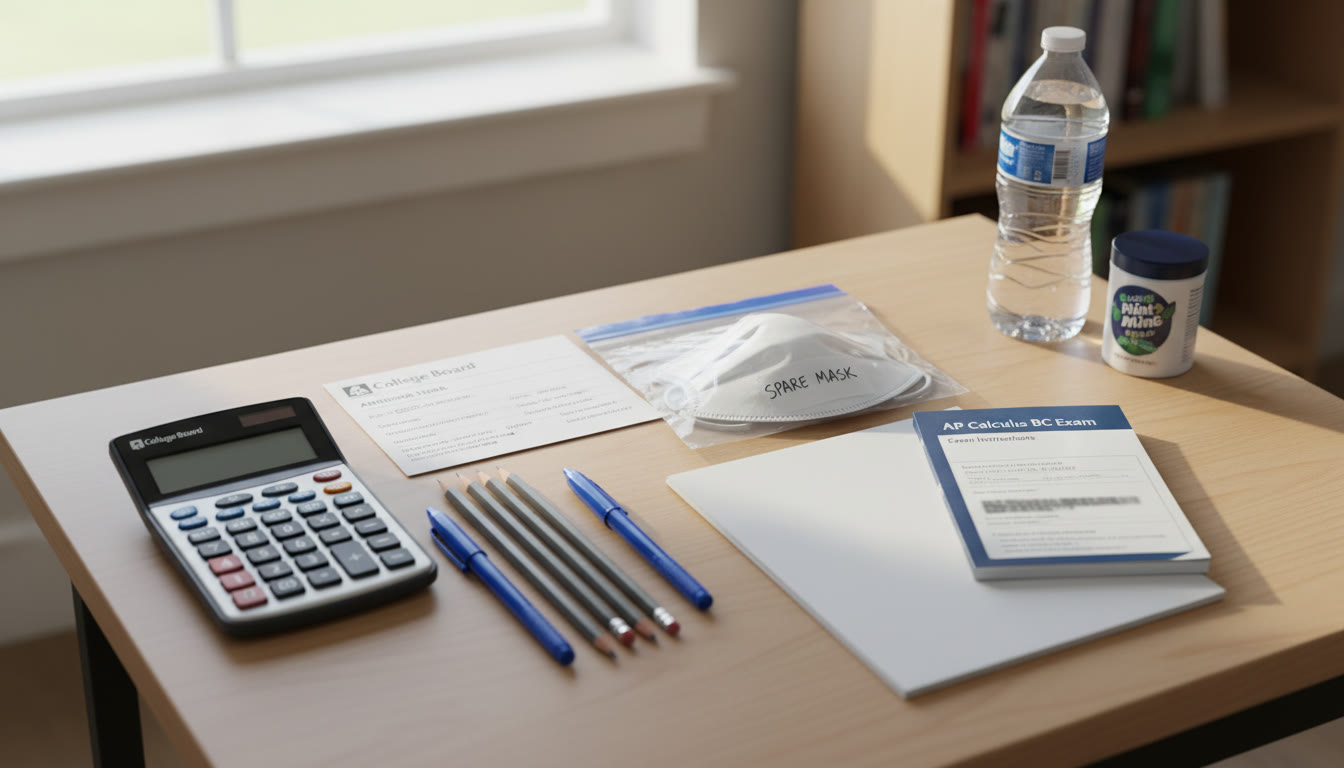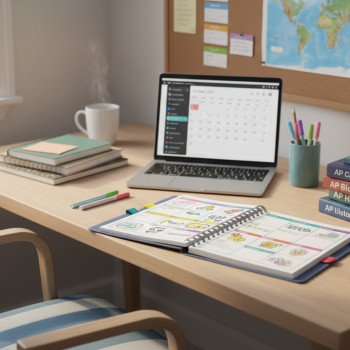Mask and Health Policies for AP Students: A Student-Friendly Guide
Walking into the exam room is one of those moments that feels equal parts excited and nervous: you’ve reviewed content, practiced timed sections, and packed your accepted calculator and ID. But in recent years another element has joined the list of things to consider — health and mask policies. Whether your school requires a mask, allows one, or has no requirement at all, knowing what to expect this year helps you focus on what matters most: doing your best on test day.

Why mask and health policies matter for AP exams
AP exams are standardized events administered under strict rules to ensure fairness and security. But along with rules about materials, electronic devices, and behavior, schools and testing sites also set health-related protocols. These can affect everything from whether you can bring a small bottle of hand sanitizer to where you sit during breaks. Policies are in place to protect everyone taking the test — students, proctors, and staff — and help maintain a controlled, distraction-free environment.
It’s also important to remember that policies may vary by school, district, and region. While the AP Program provides a baseline of permitted items and general guidance, your school’s local administrators decide on-site procedures for health and safety. That’s why a small bit of preparation can go a long way in smoothing your exam day.
How rules are set: national guidance versus local decisions
Collegeboard and AP administrators publish key exam policies and baseline permissions related to health items. But individual schools or districts may layer on additional rules based on local health guidance or school protocols. This means two students in the same district might encounter slightly different procedures if one school has adopted different measures than another. The practical outcome: always confirm with your AP coordinator or teacher what the plan is for your testing site.
Common mask and health-related rules you should expect
Here’s a clear, student-focused breakdown of typical policies you might encounter on AP exam day. These are presented as common practices; confirm the exact rules with your school.
- Masks are allowed: Most testing programs permit students to wear masks if they choose. You should be allowed to wear any mask that does not display prohibited messages or images that could be distracting.
- Follow local requirements: If your school or district requires masks for all students and staff, that requirement usually applies in the testing rooms too.
- Hand sanitizer: Many sites allow a small bottle of hand sanitizer under your desk; it may need to stay out of reach or be used only with the proctor’s permission.
- Food and drink: Generally prohibited inside the testing room unless specifically authorized as an accommodation; any break for a drink or snack is handled according to proctor instructions.
- Medical masks or face shields as accommodations: If you have a documented medical reason for a specific type of mask or PPE, bring documentation and discuss accommodations with your school’s Services for Students with Disabilities (SSD) coordinator beforehand.
Small practical rules that matter
- Bring an extra clean mask in a sealed bag in case yours becomes uncomfortable or damaged.
- Label a spare mask with your name if you’re placing it under your desk to avoid mix-ups.
- Practice taking a mask on and off comfortably and quickly so you feel confident during any verbal identification steps or when interacting with proctors.
What to do if your school has stricter health rules
Some schools may still have stricter measures in place based on local health recommendations. If your testing site requires masks, spacing, or other special steps, don’t panic — preparation helps you adapt.
- Confirm in advance: Ask the AP coordinator or your teacher what the exact rules will be before exam day. The sooner you know, the fewer surprises you’ll face.
- Plan for comfort: Test-taking is mentally demanding; choose masks that are breathable but secure. Thin, multi-layer cloth masks or disposable surgical masks often strike a balance.
- Practice timing: If you expect to take a mask off briefly for identification or a microphone check, practice doing it quickly and calmly under adult supervision so you aren’t flustered.
Accommodations and medical needs: how to handle exceptions
If you have a documented medical condition that affects your ability to wear a mask or requires special PPE, you may be eligible for accommodations. The process is most effective when started early.
Steps to request health-related accommodations
- Speak to your school’s SSD coordinator as soon as possible and explain your medical needs.
- Gather documentation from a medical professional to support the request.
- Submit the accommodation request through the school’s SSD process by the stated deadlines.
- Confirm approval and any test-day logistics well before exam day so you know what to expect.
Sparkl’s personalized tutoring can help here: if you need support writing or preparing documentation summaries, or want practice sessions that incorporate your approved accommodations (for example, practicing tests while wearing a mask or taking extended breaks), a tutor can design a tailored plan to build your confidence and stamina.
What to pack and what to leave at home
Creating a short pre-exam checklist saves mental energy the morning of the test. Here’s a student-friendly table you can print or screenshot to use the week of your exam.
| Item | Bring | Notes |
|---|---|---|
| Photo ID and AP Admission Ticket | Yes | Required for entry; have them ready in a folder. |
| Approved Mask (if desired or required) | Yes | Bring 1–2 spares in a sealed bag; label one with your name. |
| Hand Sanitizer (small) | Yes (may be placed under desk) | Follow proctor instructions for when to use it. |
| Calculator and Writing Tools | Yes (as allowed) | Check subject-specific calculator policies in advance. |
| Food or Drink | No (unless approved) | Break rules vary; only bring if you have approved accommodations. |
| Electronics (phones, smartwatches) | No | Leave them in your bag or at home; possession may lead to score cancellation. |
How mask or health policies may affect your testing experience
Wearing a mask for several hours, or sitting under specific spacing rules, can change how you usually take practice tests. Anticipating and adapting helps reduce stress and keeps your focus sharp.
Common challenges and solutions
- Breathing or discomfort: Try masks with softer edges and break them in beforehand. Take a few practice exams at home wearing the mask to build stamina.
- Glasses fogging: Use masks with a tighter nose bridge, fold a tissue at the top edge, or apply a small strip of tape (if allowed) to reduce fogging while maintaining comfort.
- Communication with proctors: If you’re concerned about verbal instructions while masked, politely ask the proctor at the start of the exam for any needed clarifications.
During the exam: respectful, calm behavior that keeps scores valid
Besides health considerations, remember that AP exams carry strict rules. Anything that could be seen as compromising exam security — including taking photos, wearing clothing with test-related information, or using unauthorized devices — may result in score cancellation. If a mask has any subject-related words or imagery, it’s best to choose a plain option to avoid confusion.
If you feel ill on exam day
- Tell the proctor immediately. They will follow school protocols and advise whether you should continue, take a break, or reschedule.
- If your illness is contagious or you’re showing symptoms, it may be safer to reschedule if that’s permitted; consult your AP coordinator about options and documentation.
- Keep records: notes from a healthcare provider can help if you need to request a makeup or submit documentation later.
Practice strategies that respect health realities
Use realistic practice sessions to mirror testing conditions. Practicing while wearing a mask, using your approved calculator, and timing breaks can make exam day feel familiar rather than surprising.
- Do at least two full-length practice exams under testing conditions you expect to encounter (mask on/off, with a small hand sanitizer bottle nearby, etc.).
- Practice quick movements like raising your hand, stepping out for an approved break, and returning — this saves minutes and nerves on test day.
- Work on concentration-building exercises: short mindfulness practices, box breathing, or simple grounding techniques for transition moments.
Personalized tutoring — for example, Sparkl’s one-on-one guidance — can help you design practice sessions that match your actual testing environment. A tailored study plan helps you practice not just content but the logistics of test day so you walk in calm and confident.
FAQ: Quick answers to common student questions
Can I wear whatever mask I want?
Generally yes, as long as it doesn’t have prohibited content or messages that could be distracting. If your school has rules about specific mask types or designs, follow those instructions.
Can I bring hand sanitizer into the testing room?
Many sites allow a small bottle kept under the desk; follow the proctor’s instruction on when and how to use it.
What if I need to remove my mask for a medical reason?
Work with your SSD coordinator ahead of time to request accommodations. Bring documentation and ensure approval is confirmed before test day.
Will wearing a mask affect my score?
No. Health measures are not tied to scoring. The goal of mask or health policies is to keep the environment safe so every student can perform to their ability.
Final practical checklist for the week of your AP Exam
- Confirm test location, reporting time, and any site-specific health protocols with your AP coordinator.
- Pack your admission ticket, photo ID, approved mask(s), hand sanitizer (if allowed), pens/pencils, and approved calculator.
- Do two realistic practice exams: one full-length practice with mask (if required) and one timed section without a mask to compare comfort levels.
- Communicate medical needs early and have SSD documentation ready if needed.
- Get a good night’s sleep, eat a balanced meal before the exam, and arrive early to settle in calmly.

Parting advice: control what you can, prepare for the rest
Test day will always hold a few unknowns, but your best defense is preparation. Confirm your school’s health rules, practice in realistic conditions, and plan logistics ahead of time. That way, whether your testing room requires masks, allows them, or has unique local measures, you’ll be ready to concentrate on the exam itself. Small actions — bringing a labeled spare mask, practicing timed sections while masked, and checking accommodation approvals early — add up to big confidence.
And if you want focused support, consider personalized tutoring that takes the full picture into account: content mastery, test strategies, and test-day logistics. Sparkl’s personalized tutoring offers one-on-one guidance, tailored study plans, expert tutors, and AI-driven insights that help you prepare not just academically but practically for the exact conditions you’ll face.
Quick recap: essential takeaways
- Confirm local mask and health rules with your AP coordinator well before exam day.
- Bring approved masks and small authorized health items (like hand sanitizer) in labeled containers.
- Request accommodations early if you have medical needs; document with your school’s SSD office.
- Practice under realistic conditions to build stamina and reduce surprises.
- Stay calm, follow proctor instructions, and focus on demonstrating your knowledge — health protocols are there to protect that opportunity.
Good luck — you’ve got this. Walk in prepared, breathe (even with a mask on if you need to), and let your hard work show. If you want help building a practice routine that mirrors your school’s testing conditions, a tailored tutoring plan can make that final stretch feel manageable and strategic.


















No Comments
Leave a comment Cancel